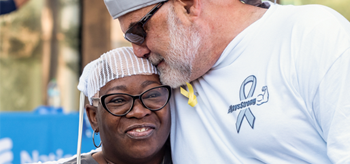National Brain Tumor Society (NBTS), a leader in brain tumor patient advocacy, research, information, and support, is pleased to see a number of important government agencies and programs receive much-needed funding increases in Congress’s FY 2022 omnibus appropriations bill.
“Members of Congress from both parties continue to demonstrate that cancer research, including brain tumors, is a nonpartisan issue,” said NBTS Chief Executive Officer, David Arons. “The brain tumor community needs breakthroughs. Too little progress has been made to discover ways to slow and stop aggressive brain tumors and too few treatments exist that transform and cure them. We look forward to working closely with Congress and the White House to optimize the government’s funding to find and bring forward better treatments that deliver profound survival and palliative benefits.”
Policy priorities championed by NBTS during the FY 2022 appropriations cycle receiving new or increased funding include:
- $1 billion for the newly established Advanced Research Projects Agency for Health (ARPA-H)
- Nearly $45 billion for the National Institutes of Health (NIH), an increase of more than 5 percent
- Nearly $7 billion for the National Cancer Institute (NCI), an increase of $353.67 million above FY 2021, which includes:
“While more funding will ultimately be needed, we are encouraged that Congress has officially moved to create ARPA-H, a key piece of the Biden administration’s Cancer Moonshot agenda, which NBTS is actively supporting,” added Arons. “We believe that ARPA-H can drive new and unique projects that bring forward innovative science and technology solutions while building capacity and synergizing with important initiatives on-going inside and funded by the NIH and NCI, including the new Glioblastoma Therapeutics Network, NCI-CONNECT, Cancer Moonshot, Childhood Cancer Data Initiative, and others.”
The FY 2022 omnibus provided additional support for pediatric and rare cancer policy and research that are urgently needed and vitally important to the brain tumor community, including:
- $130 million for the Peer-Reviewed Cancer Research Program at the Department of Defense (DoD), where pediatric brain tumors and brain cancer will remain eligible topics for funding, a $15 million increase from FY 2021
- $12.6 Million for the Gabriella Miller Kids First Research Act
- A slight increase in funding for the U.S. Food and Drug Administration (FDA), including targeted increases to focus efforts on developing treatments for rare cancers
“Though it doesn’t often feel as such, brain tumors are considered rare diseases, which in the past have been overlooked throughout the research and drug development landscape,” explained Danielle Leach, Chief of Community and Government Relations at NBTS. “This is particularly true for pediatric brain tumors, which are now the leading cause of cancer-related death in children and adolescents ages 19 and younger. However, thanks in large part to a dedicated community of advocates, momentum has built in recent years toward better policies that support rare and pediatric cancer drug development. We are very pleased to see this continue in the FY 2022 appropriations, and we celebrate these hard-won achievements made through engaged advocacy.”


